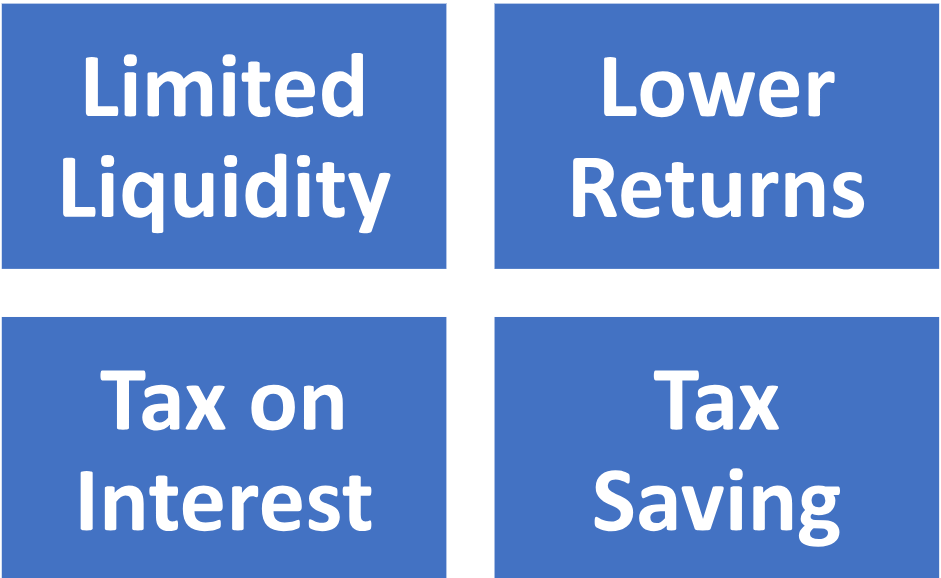 A Tax Saving Fixed Deposit (FD) is a specific financial instrument provided by banks and financial institutions in several countries, including India, to assist individuals in lowering their taxable income while encouraging saves. A Tax Saving Fixed Deposit is a financial product that allows individuals to invest a set sum for a set length of time, usually five years, in order to receive tax benefits. Investors can deduct the amount deposited under applicable tax regulations, making it a tax-efficient option to save and earn interest.
A Tax Saving Fixed Deposit (FD) is a specific financial instrument provided by banks and financial institutions in several countries, including India, to assist individuals in lowering their taxable income while encouraging saves. A Tax Saving Fixed Deposit is a financial product that allows individuals to invest a set sum for a set length of time, usually five years, in order to receive tax benefits. Investors can deduct the amount deposited under applicable tax regulations, making it a tax-efficient option to save and earn interest.
Table of Content
Significance of Tax Saving FDs
Tax Saving Fixed Deposits (FDs) are significant because they can give people a variety of financial advantages, including:
Tax Savings: FDs that are designated as Tax Savings offer deductions under particular portions of the income tax regulations, such as Section 80C in India. As a result, investors can cut their tax obligations by reducing their taxable income by the amount invested.
Stable Return: Tax Saving FDs frequently provide stable and predictable interest rates, offering a safe path for wealth growth over the course of the investment period.
Financial Discipline: The mandatory lock-in period encourages individuals to save for the long term, fostering a savings habit and disciplined financial planning.
Risk Mitigation: Tax Saving FDs are generally considered low-risk investments as they are offered by reputable banks and financial institutions, ensuring the safety of the principal amount.
Liquidity After Lock-in: Tax Saving FDs offer liquidity after the lock-in period, enabling investors to access their money in the event of emergencies or shifting financial demands.
Diversification: By combining Tax Saving FDs with other investments including equity and debt instruments, investors can diversify their tax-saving portfolio.
Key Features of Tax Saving Fixed Deposits
The key features of Tax Saving Fixed Deposits (FDs) are as follows:
- Lock-in Period: Tax Saving FDs come with a mandatory lock-in period, typically of 5 years in India. During this period, investors cannot withdraw their funds without penalties.
- Tax Deductions: Investments made in Tax Saving FDs are eligible for tax deductions under specific sections of the income tax laws, such as Section 80C in India. This allows investors to reduce their taxable income by the amount invested, subject to a maximum limit.
- Eligibility: Generally, any resident individual, Hindu Undivided Family (HUF), and sometimes even senior citizens and minors, can invest in Tax Saving FDs. Specific eligibility criteria may vary by country and financial institution.
- Deposit Limit: The amount that can be invested in Tax Saving FDs to qualify for tax deductions often has a maximum limit. For Section 80C deductions in India, the annual cap is INR 1.5 lakh.
- Fixed Interest Rate: For the duration of the deposit, Tax Saving FDs give a predetermined, fixed interest rate. As a result, returns are stable and predictable.
- Options for Interest Payment: Investors have the option of periodic interest payments (such as monthly, quarterly, or annual payments) or reinvesting interest to increase returns.
- Premature Withdrawal: Although withdrawals are restricted during the lock-in period, certain financial institutions may permit premature withdrawals in certain situations, subject to fees and lower interest rates.
Documents Required for Tax Saving Fixed Deposits
Opening a tax-saving deposit at banks and post offices requires identification and address verification. You may provide any of the following documents as identification and proof of address:
Identity Proof
- Passport
- PAN card
- Voter ID card
- Driving license
- Government ID card
- Senior citizen ID card
Address Proof
- Passport
- Telephone bill
- Electricity bill
- Bank Statement with Cheque
- Certificate/ ID card issued by Post office
Tax Benefits – Section 80C deduction
Section 80C of the Income Tax Act in India offers taxpayers significant tax benefits by allowing them to claim deductions on specified investments and expenditures, thereby reducing their taxable income. As of my most recent knowledge update in September 2021, taxpayers may deduct up to INR 1.5 lakh per fiscal year under Section 80C. Hindu Undivided Families (HUFs) and individuals are also eligible for this deduction. Taxpayers may invest in a range of financial products that are qualified for the deduction, such as Tax Saving Fixed Deposits (FDs), Employee Provident Funds (EPF), Public Provident Funds (PPF), National Savings Certificates (NSC), Equity-Linked Savings Schemes (ELSS), and more.
Section 80C deductions come with distinctive features, including a mandatory five-year lock-in period for many investments, such as 5-year fixed deposits tax free, which are not subject to tax. The taxpayer’s taxable income is decreased by the amount invested in these instruments, which is deducted from their gross annual income. As a result, the tax liability is decreased, making it an effective tool for tax planning and saving. The ability for taxpayers to distribute their deduction cap among a variety of permissible investments allows them to build a diverse portfolio of tax-saving investments.
Risks and Considerations

Here are the main dangers and factors to think about while buying Tax Saving Fixed Deposits is a brief format:
Limited Liquidity: Tax Saving FDs have a lock-in period that limits access to money in times of need and may result in fees for early withdrawal.
Lower Returns: Compared to other investment options, Tax Saving FD interest rates are often lower, which may slow long-term wealth creation.
Tax on Interest: In India, Section 80C allows for the deduction of principle amounts; nevertheless, interest income is taxed, which lowers effective returns, particularly for those in higher tax rates.
Tax Saving :FD returns might not keep up with inflation, which might gradually reduce the real value of savings.
Conclusion
In conclusion, Tax Saving Fixed Deposits (FDs) provide investors with a tax-efficient alternative to save money and lower their taxable income. However, it include a number of risks and issues, such as restricted liquidity, reduced returns relative to alternative investments, taxation on interest earnings, inflation erosion, and the opportunity cost of locking up money during the lock-in period. Fixed Deposits (FDs) offer tax exemption benefits, particularly with Tax Saver FDs. While these investments come with a lock-in period to enjoy tax benefits, premature withdrawal options are generally limited. Tax-free FDs are a great way to grow savings without the burden of taxation. Tax Saving FDs offer security and tax advantages, but a diverse tax-saving portfolio can help maximize returns and properly manage risks.
CA Pulkit Goyal, is a fellow member of the Institute of Chartered Accountants of India (ICAI) having 10 years of experience in the profession of Chartered Accountancy and thorough understanding of the corporate as well as non-corporate entities taxation system. His core area of practice is foreign company taxation which has given him an edge in analytical thinking & executing assignments with a unique perspective. He has worked as a consultant with professionally managed corporates. He has experience of writing in different areas and keep at pace with the latest changes and analyze the different implications of various provisions of the act.
Categories
- Agreement Drafting (23)
- Annual Compliance (11)
- Change in Business (36)
- Company Law (148)
- Compliance (90)
- Digital Banking (3)
- Drug License (3)
- FEMA (17)
- Finance Company (42)
- Foreign Taxation (6)
- FSSAI License/Registration (14)
- GST (118)
- Hallmark Registration (1)
- Income Tax (200)
- Latest News (34)
- Miscellaneous (164)
- NBFC Registration (8)
- NGO (14)
- SEBI Registration (6)
- Section 8 Company (7)
- Start and manage a business (21)
- Startup/ Registration (130)
- Trademark Registration/IPR (40)
Recent Posts
- NGO Darpan Registration in Jaipur May 2, 2024
- Registration of Charges with ROC May 1, 2024
- Post incorporation compliances for companies in India April 30, 2024
About us
LegalWindow.in is a professional technology driven platform of multidisciplined experts like CA/CS/Lawyers spanning with an aim to provide concrete solution to individuals, start-ups and other business organisation by maximising their growth at an affordable cost.









